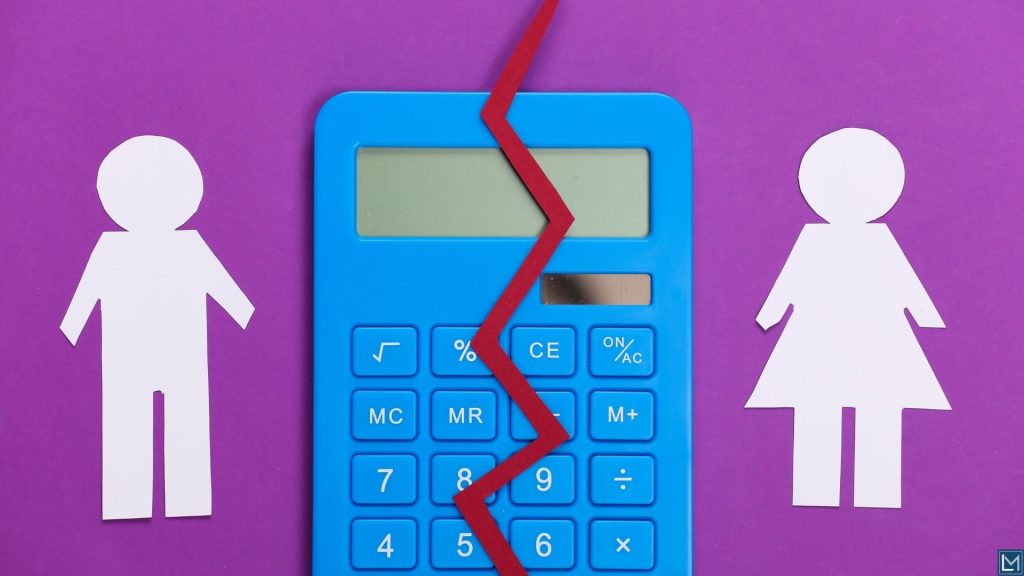PROTECTING YOUR FAMILY'S FINANCIAL FUTURE
Dividing Property in Divorce

The divorce process, in and of itself, is an emotionally draining time, requiring most if not all your attention. When property involved must be protected from your soon-to-be-ex-spouse, this stress is only heightened.
It can often seem intimidating to begin the process of dividing assets in a divorce. However, it is a necessary step to beginning the rest of your life. At the Law Offices of Lisa R. McCall, we strive to make the division of property as seamless as possible so you can smoothly continue the transition to life after your divorce.
Why You Need a Property Division Lawyer
Both sides are under a great deal of stress during this extremely sensitive time and the division of assets from marriage often involves emotional ties much deeper than the property at hand. At the Law Offices of Lisa R. McCall, we are sympathetic to the needs and emotions experienced by each of our clients. We will guide you through this process, informing you of your best options and making sure you completely understand the strategy involved in your Orange County divorce and property division case. Our goal is for you, our client, to come through this process without anxiety or concern for your financial future.
Our firm is experienced in dividing complex estates, including division of different types of businesses and tracing of a spouse’s separate property interest, division of different types of retirement accounts, allocation of debts, calculation of credits and charges, and separate property tracings.
Because of the complex nature of divorce law/division of assets and property during and after a dissolvement of a marriage/domestic partnership, we have taken the steps necessary to answer some of the most important questions when it comes to the most fundamental aspects of divorce law. While these answers do not constitute official legal advice or mean you are officially a client of Lisa R. McCall Law Offices, we hope you will learn some useful information about property division. For more information on these topics from an Orange County property division attorney, contact the Law Offices of Lisa R. McCall today.
What Is Community Property and How Is Property Divided in a Divorce?
California is considered a “community property state,” which means that all property of the marriage belongs to the “community” (both married spouses) and must be divided equally in a divorce. According to California community property laws, all property and all debts secured during the marriage belong to both partners. As such, this property must be allocated evenly by the courts in the event of a divorce. Property includes financial assets and physical property and can also include businesses one or both spouses own together or were bought/managed during the marriage itself.
Since California divorce law deems that divorce is “no fault,” meaning no one person is culpable for the end of the marriage, community property applies even if a marriage ends badly due to infidelity. In fact, the only two reasons for divorce are irreconcilable differences and diminished mental or physical capacity, neither of which affect the distribution of property during divorce.
Many divorcing spouses learn they owned more community property than they initially thought, which is why it is best to review all potential property with an Orange County property division attorney with experience in divorce law. For example, your former spouse might have a pension plan from their place of employment. Under community property law, you could receive part of those funds if they were earned while you and your former spouse were legally married or in a domestic partnership.
Does Community Property Apply to Debt?
Community property applies in the case of debt incurred during the marriage. In addition, debt incurred by only one party remains the responsibility of the marriage, and creditors may pursue both spouses for repayment under California law. For instance, if a credit card exists in the name of one partner and not the other, resulting debt is the responsibility of both parties unless both spouses agree to assign the debt to one individual during debt assignment. Even if you are not aware that your spouse had debt outstanding, you are still responsible for payments until the divorce order states otherwise.
It is in the best interest of all parties involved to try mediation first to reach a reasonable agreement outside of court. This will preclude the need for a long debt assignment process with court fees. However, if you cannot agree upon an equitable division of assets and resolution of debt the Law Offices of Lisa R. McCall are here to assertively campaign for you and your interests.
What Does Equitable Division of Property Mean?
When many people think of the term “equitable,” they often think of assets being split down the middle, where both sides get 50%. California divorce law certainly attempts to maintain this equal division with its focus on community property. However, what occurs during a divorce is often much more complicated.
Equitable division does not mean that everything is automatically split down the middle 50/50 but, rather, as evenly and as fairly as possible. Thus, in an equitable property division state, the numbers on each side might not perfectly match up. Even in a California divorce, spouses can come to an agreement to fairly divide property, and attorneys utilize Moore/Marden calculations, cash flow, and other financial considerations to determine the fairest arrangement.
What Is the Moore/Marsden Calculation?
The term Moore/Marsden comes from two cases (Moore in 1980 and Marsden in 1982) heard by the California Supreme Court, as well as the California Appellate Court. Both cases dealt exclusively with how to decide the community property interest in a family home. As a result of the rulings, attorneys must apply the Moore/Marsden calculations as a formula to determine what portion of your family’s home has become community property due to mortgage payments made with community funds during the course of your marriage.
To arrive at this amount, attorneys consider the value of the home at purchase compared to the current market value, the percentage of the price of the home paid during the marriage with community funds, and compare the amount paid to the increase in value. This is the portion of the home that is community property. We can direct you to the appropriate expert for your case and guide you through the process of business valuation, separate property tracings, Moore/Marsden calculations (to determine the community property interest in a separate property home), marital balance sheets, and cash flow.
What Is Considered “Separate” or “Off-Limits” in Divorce Division of Assets/Property?
In California, anything you owned before you were married is considered your personal property and separate from the community property in the divorce. Separate property also extends to any inheritances/trusts/gifts given to one spouse, even if the acquisition occurred during the marriage. For example, if one of your family members passed away and left you money in their Last Will and Testament, that money belongs to you alone and cannot be divided with the rest of the community property.
Of course, any property obtained after the divorce is separate, as is property obtained during a legal separation. In addition, pre-marital debts like student loans are not transferred to the other spouse during marriage. However, if you choose to place your spouse’s name on the deed or title to any separate property, that property becomes community property. Similarly, if you intermingle inheritance funds with community property in a joint banking account, you risk division of those funds in court.
Legal Separation vs. Divorce
Legal separation is an option for couples who wish to bring closure to the relationship without fully dissolving the marriage. Couples who choose this route might do so for religious reasons where their faith does not allow divorce, because of health insurance matters where one or both spouses want to retain health insurance coverage, or because there are children involved. Spouses may live separately, and the courts will order which rights are retained and assign duties to each spouse during the separation period.
Whatever the reason might be for the legal separation versus divorce, it is important to note that you cannot remarry while you are legally separated. Similarly, you will remain your spouse’s next of kin until divorce occurs. For this reason, property rights, debts, and liabilities remain much as they were during the marriage, and any property division must occur with your unique situation in mind. Legal separation is still a process that must be carried out in court and the use of an attorney is highly encouraged, even if the separation is amicable on both sides. However, while a legal separation lends itself easily to reconciliation, a divorce cannot be reversed in court without re-marriage.
Divorce Residency Requirements
One of the most common reasons spouses choose legal separation over formal divorce is because they cannot fulfill California’s divorce residency requirements and do not wish to wait for decisions on custody of children or property division. Residency requirements state that before you can file for divorce in California, you must prove you have lived in the state for at least six months. In addition, you must prove you have lived in the county in which you are filing for divorce for three months at minimum.
For legal separation, divorce residency requirements do not apply. Therefore, it is possible for a couple to decide to legally separate until such a time one or both are eligible under these residency requirements. At that time, they can legally divorce.
Do You Divide Assets in a Legal Separation?
When you and your spouse decide to live separately without obtaining a divorce, questions naturally arise surrounding the division of your marital property. Spouses can choose to reach a property division agreement by themselves, with attorneys, or with the help of professional mediators. If no agreement is possible through these means, property division may need to go to court.
To divide property in court during a legal separation, the courts must schedule hearings to establish both spouses’ arguments, hear expert witness statements, as well as examine other evidence or testimony to demonstrate both community property and separate property. Since separated couples are still legally married, utility payments, mortgages of any property, health care costs, taxes, and the like must be divided during the legal separation. As a couple, the spouses may need to sell certain assets and properties during the period of legal separation to pay off debts or settle other financial matters.
To help navigate the intricacies of this process, most divorce attorneys highly encourage mediation to avoid a lengthy court process. Mediation can occur at a neutral site and allow both spouses and their attorneys to rationally discuss the equitable division of property without the stress of a court environment. Whether you choose mediation or the courts, it is crucial to secure the assistance of an Orange County property division attorney who knows the system and can fight for you.
Orange County Property Division Attorneys You Can Trust
At the Law Offices of Lisa R. McCall, we have developed a wealth of knowledge and experience when it comes to divorce and the division of assets. At the same time, we strive to tailor your case strategy to you and your best interests—we never use a “one size fits all” approach for our valued clients. A divorce or legal separation is not an easy time for anyone involved, and we will handle your case with the utmost sensitivity and respect. We are determined to fight for you and your family’s future, so you come away from your divorce or legal separation knowing that your financial and property needs are met.
Made up of two experienced attorneys and one paralegal, our small firm has over 20 years of combined legal experience ready to work for you, securing the best outcome for you and your family.
Contact the Law Offices of Lisa R. McCall to get started on your case today. You will be one step closer towards dissolving your marriage, allocating your property fairly and equitably, and achieving the new beginning you deserve.







